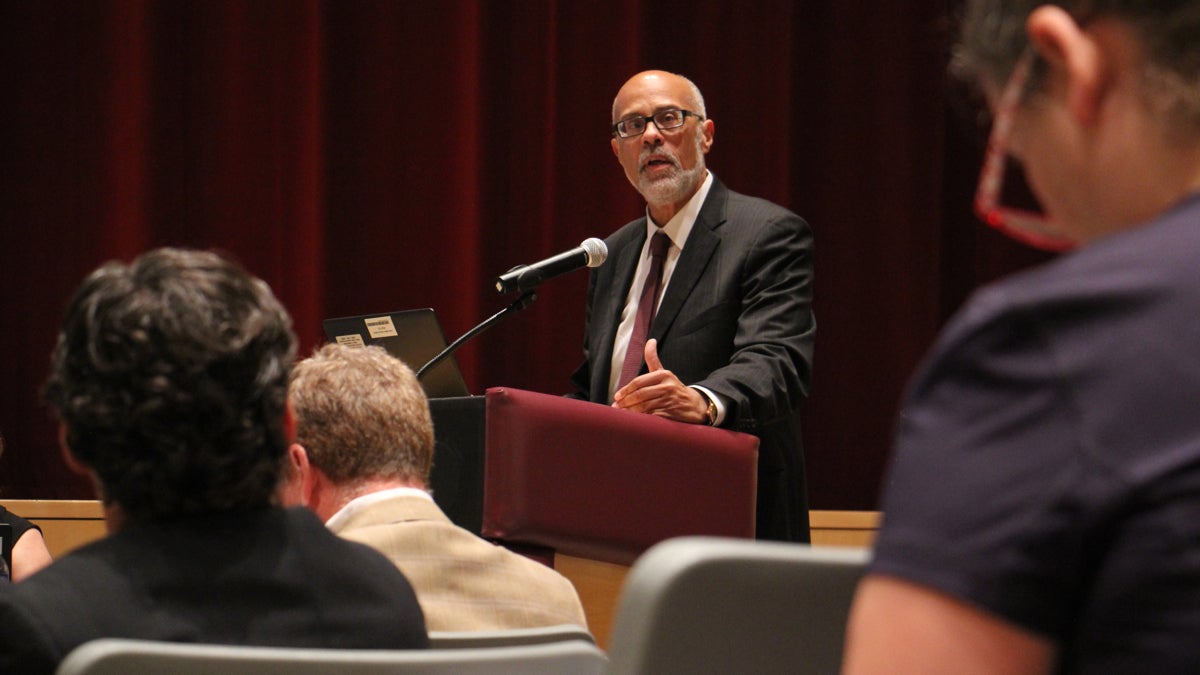After another twist, Pa. Supreme Court to hear Lower Merion tax case
In 2016, an aviation attorney and Lower Merion resident sued his school district claiming it misrepresented its finances to secure a tax increase without voter approval.
Listen 1:12
Lower Merion schools Superintendent Robert Copeland defends the district's budgeting practices during a 2016 school board meeting after a judge ruled that the district misled taxpayers. (Emma Lee/WHYY)
In 2016, aviation attorney and Lower Merion resident Arthur Wolk sued his school district claiming it misrepresented its finances in order to secure a tax increase without voter approval.
More than two years later, that case has mutated into a civil procedure clash that will go before the Pennsylvania Supreme Court on Wednesday. The case has even attracted the attention of the state ACLU, which filed an amicus brief backing the school district’s right to appeal the original decision.
By the time the legal dust clears, Wolk’s wonky crusade could end up altering local tax policy and the ability of appellants to make speedy appeals to higher courts. All the while, residents in one of Pennsylvania’s wealthiest enclaves wonder whether they’ll get a major refund.
So, how did we get here?
The original case has to do with whether Lower Merion broke the law in 2015-16 and 2016-17 when it raised property taxes more than 2.4 percent. A state law known colloquially as “Act 1” says school districts can’t raise taxes more than 2.4 percent unless they receive approval from district voters or a special waiver from the state. To get that waiver, a district has to prove it really needs the extra taxpayer money.
Lower Merion has done this repeatedly, but Wolk believes they’ve illegally spun their financial documents in order to get the waivers and circumvent voters.
Hundreds of other Pennsylvania school districts have also gotten waivers from the state. That’s why this case is crucial for local education advocates, and why organizations such as the Pennsylvania School Board Association, the Pennsylvania State Education Association, Pennsylvania Association of School Administrators, and the Pennsylvania Association of School Business Officials filed briefs supporting Lower Merion.
But in August of 2016, a trial court judge in Montgomery County sided with Wolk.
Faced with the prospect of paying back money to taxpayers, Lower Merion School District appealed the decision.
And that’s where the second dispute arises.
Lower Merion’s lawyers from the law firm Drinker Biddle & Reath tried to appeal immediately using something called an “interlocutory appeal.” Such appeals are lodged when the case is still pending, at least in some regard.
Wolk said the district’s lawyers made a mistake. They should have filed something called “post-trial motions,” which are a chance for the trial judge to review his or her decision and suss out any errors before the case potentially goes to a higher court.
Filing post-trial motions can take a while, said Mary Catherine Roper, deputy legal director of the ACLU of Pennsylvania. An interlocutory appeal is generally quicker, but only available to plaintiffs in situations where the court filed a preliminary injunction rather than a permanent injunction.
Again, the courts have sided with Wolk.
The Commonwealth Court said the district should have filed post-trial motions. Since it didn’t, it’s appeal is invalid.
The district and its lawyers have now appealed that decision to the state’s Supreme Court, which will hear oral arguments Wednesday on whether the district properly appealed the first decision.
It’s confusing, but it drives at an issue that Roper says is important to organizations like the ACLU. In cases where the ACLU believes the government is doing some immediate harm to a group of plaintiffs, the ACLU may want to bring a speedy appeal instead of waiting for a trial court judge to sift through post-trial motions. If the Supreme Court sides with Wolk, it could hamstring the ACLU in future cases.
“That’s a major thing,” said Roper. “If we are bringing a case for injunctive relief it’s because we think there’s something the government’s doing that’s harming people.”
The ACLU and an organization that represents Pennsylvania defense lawyers filed briefs supporting Lower Merion School District, even though the ACLU, Roper says, has no interest in the original tax case.
Wolk, in his brief to the state Supreme Court, claimed the ACLU only got involved because Roper used to work at Drinker Biddle & Reath, the law firm representing Lower Merion School District.
“[T]his is a payback to her old bosses,” Wolk wrote in his brief. “Since when does the ACLU embrace illegal conduct by government?”
Roper laughed at that accusation.
“Mr. Wolk figured out that I worked at Drinker Biddle & Reath 14 years ago … and decided that that’s the only reason we filed a brief, which is not how the ACLU works,” said Roper. “When we file a brief it’s because the ACLU has an interest in the case.”
(The ACLU, Roper said, actually disagrees with some parts of Lower Merion’s argument, even though it believes the district should have been granted an appeal.)
The “payback” flap is just the latest little twist in a case that seems full of them. And hovering over all of this are potentially major implications for Pennsylvania school districts considering tax hikes.
If Wolk wins again in the state Supreme Court, Lower Merion School District will likely have to refund residents and other districts will have to think twice during the budget season.
“That would be a signal to other school districts to go to accurate budgeting and not this bizarre budgeting methodology that they currently use,” said Wolk.
It would be a signal, but not the strongest signal possible. If Lower Merion can’t appeal the trial court decision, the legal record on this matter will consist of just one lower-court decision. Education observers would have to wait for another, a similar case to arise before potentially hearing what the Commonwealth Court and Supreme Court think about these type of tax hikes.
If Wolk loses, however, and the district gets to appeal, we’ll hear from the Commonwealth Court and eventually, perhaps, the state Supreme Court on the merit of Wolk’s original case. That kind of legal path could establish a much firmer precedent for what districts have to prove when they seek state waivers.
Then there’s always the possibility the state Supreme Court mulls the case before it right now and issues an opinion with clear signals about the original tax case.
Everything is on the table for a weird case that keeps getting weirder.
WHYY is your source for fact-based, in-depth journalism and information. As a nonprofit organization, we rely on financial support from readers like you. Please give today.






